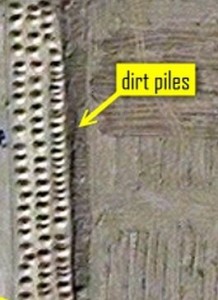I noted on Tuesday that Fredrik Dahl of Reuters dutifully transcribed accusations from anonymous “Western diplomats” to report that satellite images (which David Albright finally published yesterday–I’m so happy we get to see those dirt pile photos!) revealed that Iran had brought fill dirt to the Parchin site where there have been accusations that Iran may have carried out work on developing an explosive trigger for a nuclear weapon. That post had barely been up for an hour or two when George Jahn unleashed a spectacularly bad graph purporting to show Iranian calculations on nuclear bomb yields. Glenn Greenwald did a terrific debunking of the graph yesterday, showing, among other things, how profoundly wrong the science in the graph was. I had noted back in September, when Jahn first started hinting at what turned out to be his beloved graph, that this particular accusation first came to light in the November, 2011 IAEA report. Jahn and those who are feeding him his “exclusives” sat on this graph for a year before releasing it, presumably because it is so craptastically ridiculous that it could not be made public until the laughter over Bibi’s bomb cartoon and the pink tarps had died down.
The timing of this nearly simultaneous flinging of poo by Dahl and Jahn is explained by the fact that the IAEA is meeting now to discuss the most recent report on Iran’s nuclear activities. The US is using this meeting to roll out a new bit of “leverage” against Iran, stating that if Iran does not comply with IAEA requests by the time of the next IAEA report in March, the US will request that the IAEA refer Iran to the UN Security Council for its intransigence. Aside from how hypocritical this announcement looks, coming within just a few hours of the US condemning the UN for allowing Palestine to achieve non-member observer status, it also appears that Iran knew this ploy was coming. Today we see a report from Mehr News noting that Iran has reported the US to the UN for violating Iranian airspace at least eight times during October.
Lost in all of this noise is the fact that for all the posturing over Iran’s 20% enriched uranium being “close” to weapons grade, Iran continues to divert significant amounts of the 20% enriched material into fuel plates for the Tehran reactor where the uranium has become chemically incapable of further enrichment to weapons grade. From David Albright’s summary of the most recent IAEA report (pdf), we see that Iran has produced 232.8 kg of 20% enriched uranium but has diverted 95.5 kg, or 41%, of this to fuel plates. Back in August, Moon of Alabama explained the significance of the chemical changes that take place when fuel plates are produced [emphasis in original]:
But enriched Uranium can have several forms. For enrichment natural Uranium is converted into Uranium hexafluoride (UF6) and, slightly heated and under pressure, fed as a gas into centrifuges to separate out the U-238 isotopes. This increases the content of U-235 isotopes needed for nuclear reactions. The enrichment product with 20% U-235 is still in the form of UF6 which could be again fed into a centrifuge cascade for even higher enrichment levels.
But UF6 is not usable as nuclear reactor fuel. For reactor use the UF6 has to be converted into Triuranium oxtoxide (U3O8) and from there into Uranium dioxide UO2. These can be formed into fuel elements to be fed into a reactor. Once this is done there is no easy and quick process to convert these fuel elements back into UF6 for further enrichment. Enriched UF6 once converted into U3O8 and UO2 fuel plates is thereby not usable for producing bomb grade uranium and of little proliferation concern.
In addition to the removal of significant quantities of 20% enriched uranium from the stockpile that could be further enriched, the Parchin site, for all the accusations, still retains the building where the accused high explosives work is believed to have taken place. As I have pointed out numerous times, the explosives chamber itself would almost certainly retain a radioactive signature of the accused work, and there is no evidence the chamber has been removed. Further, even the extensive soil rearrangement still leaves the IAEA with known targets for soil testing to look for contamination that was not completely removed. If access to Parchin is granted, it still seems possible to determine whether trigger work has been carried out.
Despite all of this dancing around weak accusations against Iran’s nuclear intentions, an outright attack on Iran did not occur before the US elections and Iran now has diverted a significant portion of its 20% enriched uranium from potential further enrichment. Perhaps saner heads will win out and a war can be averted despite the best efforts of many players in this drama.
